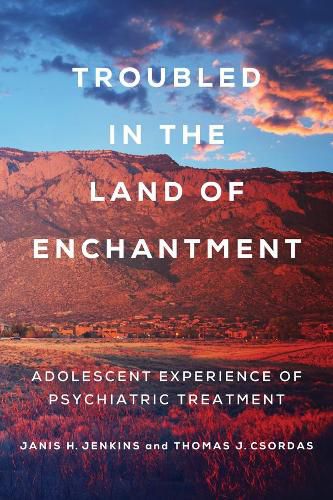Readings Newsletter
Become a Readings Member to make your shopping experience even easier.
Sign in or sign up for free!
You’re not far away from qualifying for FREE standard shipping within Australia
You’ve qualified for FREE standard shipping within Australia
The cart is loading…






In this groundbreaking study based on five years of in-depth ethnographic and interdisciplinary research, Troubled in the Land of Enchantment explores the well-being of adolescents hospitalized for psychiatric care in New Mexico. Anthropologists Janis H. Jenkins and Thomas J. Csordas present a gripping picture of psychic distress, familial turmoil, and treatment under the regime of managed care that dominates the mental health care system. The authors make the case for the centrality of struggle in the lives of youth across an array of extraordinary conditions, characterized by personal anguish and structural violence. Critical to the analysis is the cultural phenomenology of existence disclosed through shifting narrative accounts by youth and their families as they grapple with psychiatric diagnosis, poverty, misogyny, and stigma in their trajectories through multiple forms of harm and sites of care. Jenkins and Csordas compellingly direct our attention to the conjunction of lived experience, institutional power, and the very possibility of having a life.
$9.00 standard shipping within Australia
FREE standard shipping within Australia for orders over $100.00
Express & International shipping calculated at checkout
In this groundbreaking study based on five years of in-depth ethnographic and interdisciplinary research, Troubled in the Land of Enchantment explores the well-being of adolescents hospitalized for psychiatric care in New Mexico. Anthropologists Janis H. Jenkins and Thomas J. Csordas present a gripping picture of psychic distress, familial turmoil, and treatment under the regime of managed care that dominates the mental health care system. The authors make the case for the centrality of struggle in the lives of youth across an array of extraordinary conditions, characterized by personal anguish and structural violence. Critical to the analysis is the cultural phenomenology of existence disclosed through shifting narrative accounts by youth and their families as they grapple with psychiatric diagnosis, poverty, misogyny, and stigma in their trajectories through multiple forms of harm and sites of care. Jenkins and Csordas compellingly direct our attention to the conjunction of lived experience, institutional power, and the very possibility of having a life.